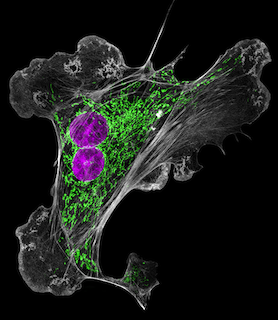
David Pellman, M.D.
David Pellman, M.D. is the Margaret M. Dyson Professor of Pediatric Oncology at the Dana-Farber Cancer Institute, a Professor of Cell Biology at Harvard Medical School, an Investigator of the Howard Hughes Medical Institute, and the Associate Director for Basic Science at the Dana-Farber/Harvard Cancer Center. He received his undergraduate and medical degrees from the University of Chicago. During medical school, he did research at the Rockefeller University. His postdoctoral fellowship was at the Whitehead Institute/Massachusetts Institute of Technology.
The Pellman Lab works on the mechanism of cell division and how certain cell division errors drive rapid genome evolution. The normal processes studied in the laboratory have included spindle positioning and asymmetric cell division, the mechanism of spindle assembly and cytokinesis, and the mechanism of nuclear envelope assembly and how it is coordinated with chromosome segregation. The mutational processes studied in David’s group are particularly important for cancer, but have relevance for genome evolution in other contexts. Current projects include: the mechanism of a newly discovered mutational process called “chromothripsis”, how the architecture and integrity of the nuclear envelope impacts genome maintenance, and the role of cytoplasmic chromatin in triggering innate immune proinflammatory signaling. The lab uses a variety of approaches which include, molecular genetics, biochemistry, and imaging. Currently there is a heavy emphasis on using a combination of live-cell imaging and single-cell genome sequencing developed in the lab (“Look-Seq”) to relate the consequences of cell division errors to genome alterations.
Dana Farber Cancer Institute
Dept. of Pediatrics, Mayer-612
450 Brookline Ave
Boston, MA 02115
Lab phone: 617-632-4918
Lab fax: 617-632-5363
Nat Commun
View full abstract on Pubmed
Nat Genet
View full abstract on Pubmed
J Cell Biol
View full abstract on Pubmed
Nat Genet
View full abstract on Pubmed
Nat Commun
View full abstract on Pubmed
Science
View full abstract on Pubmed
Nat Genet
View full abstract on Pubmed
